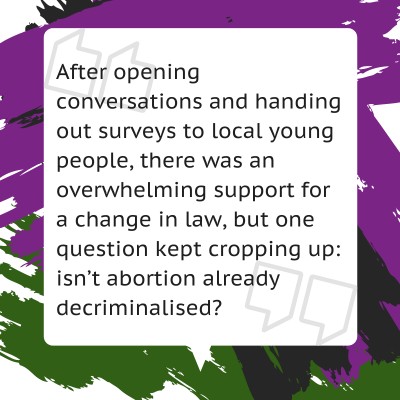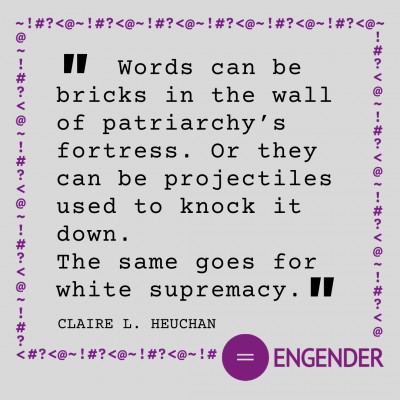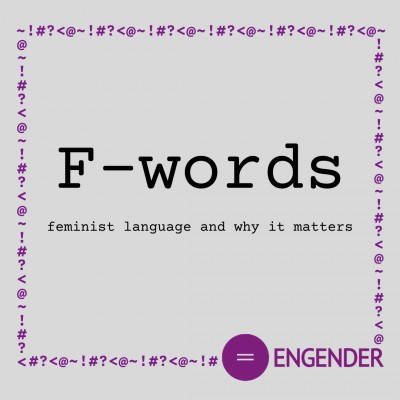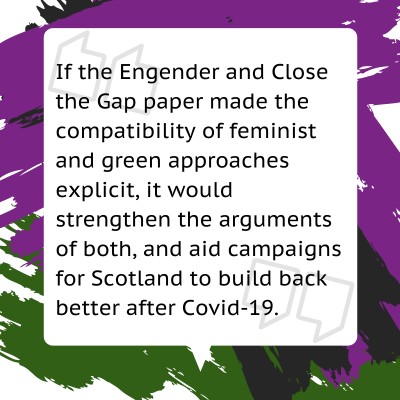Engender blog
GUEST POST: Decriminalisation of Abortion for a Modern Scotland

Following the passing of a motion in support of decriminalisation of abortion during the Scottish Youth Parliament's virtual motion debates this spring, MYSP's Emily Harle and Erin Campbell have written for us on why access to abortion is an important issue for Scotland's young people.
Emily Harle (she/her) is a Trustee and member of the Scottish Youth Parliament (MSYP) for Glasgow Kelvin, and Erin Campbell (they/them) is an MSYP for Midlothian North and Musselburgh, and the Deputy Convenor of SYP’s Equalities and Human Rights Committee. The Scottish Youth Parliament is the democratically elected voice of Scotland’s young people, aged 12-25. You can read more about SYP here, and follow them on Twitter @OfficialSYP. You can also follow Emily @EmilyMSYP, and Erin @syperincampbell.
In 1861, the Offences Against the Persons Act passed and abortion became a criminal offence in the UK, with women facing a penalty of life imprisonment for terminating a pregnancy. This outdated law was never overturned. The 1967 Abortion Act, which is commonly said to have legalised abortion, did not fully decriminalise it. Instead, the law provided an extremely strict set of criteria under which the procedure would be permissible, including a requirement for two written doctor’s signatures to confirm that continuing the pregnancy would severely damage either the mother or child.
F-words: Language, power, and Blackness

In this first blog in our 'F-words' series, Claire L. Heuchan writes about how the capital 'B' in Black illustrates the link between words and anti-oppression. Claire tweets as SisterOutrider and blogs here.
Since taking my own place in the feminist movement, I’ve given a lot of thought to the relationship between language and power. Words are the markers we use to make sense of the world around us and where we fit in it. The language we choose can uphold social inequalities. Or it can challenge them. There is a connection between words and power, a bond that thrums with potential. Everyday words and phrases can be turned on their head, their meaning subverted.
The earliest example I can remember hearing comes from The Fresh Prince of Bel-Air. The Banks family had gathered round the dinner table for their evening meal. A Christian family, they kicked off dinner by saying grace. And Ashley Banks – Will’s cousin, who brought a much-needed feminist perspective to the series – finished her prayer with ‘a-women’.
F-words: introducing our new blog series on feminist language

Language matters. The words we use, and the contexts in which we use them, come with baggage, preconceptions, cultural implications, and potential for misunderstandings. Used well, language can uplift – bringing nuance to conversations, enabling accuracy in policy discussions, and ensuring that people feel welcome and included. At its worst, language can be used to obfuscate, exclude, and offend.
GUEST POST: A recovery plan which works for women also works for the planet

Claire Duncanson is a Senior Lecturer in International Relations at the University of Edinburgh. She has published widely on issues relating to gender, peace and security, with a particular focus on gender and peacebuilding. Her current work aims to bring a feminist analysis to the political economy of building peace, and she's an active member of the Women’s International League for Peace and Freedom (WILPF). You can follow Claire on Twitter @cpduncanson, read more blogs at GenderED, and find out about her academic research here.
Engender and Close the Gap’s new paper outlining nine principles for economic recovery provides a valuable roadmap for Scotland to emerge from Covid-19 in ways that address the pandemic’s alarming gendered impacts. However, as important as its ideas are, it fails to make a critical connection, one at the heart of our country’s future. While the paper’s nine principles are offered as a path to a fairer, more just, more equal and inclusive Scotland, they can and must also be understood as providing a strong foundation for addressing and arresting the climate and biodiversity crises. This is an increasingly urgent task given Scotland’s recent rise in carbon emissions and its damaged and depleted ecosystems, but mention of this potential benefit of their approach is surprisingly absent from the paper.
GUEST POST: Some thoughts on issues BAME women, including immigrants, face in the UK
Azita Jabbari-Arabzadeh is a BAME migrant women with an extensive background working with BAME women, including migrants and refugees. In this guest blog, Azita explores some of the issues which face migrant women in the UK, with a particular focus on health inequality.
I came across some shocking news regarding the health and the high rate of death of pregnant black women recently, which I believe, together with the news of a higher rate of mental health issues among South Asian women in the UK is at least worthy of some thoughts by the population and certainly worth sharing worth sharing with readers of the On the Engender blog.
Downloads
 Engender Briefing: Pension Credit Entitlement Changes
From 15 May 2019, new changes will be introduced which will require couples where one partner has reached state pension age and one has not (‘mixed age couples’) to claim universal credit (UC) instead of Pension Credit.
Engender Briefing: Pension Credit Entitlement Changes
From 15 May 2019, new changes will be introduced which will require couples where one partner has reached state pension age and one has not (‘mixed age couples’) to claim universal credit (UC) instead of Pension Credit.
 Engender Parliamentary Briefing: Condemnation of Misogyny, Racism, Harassment and Sexism
Engender welcomes this Scottish Parliament Debate on Condemnation of Misogyny, Racism, Harassment and Sexism and the opportunity to raise awareness of the ways in which women in Scotland’s inequality contributes to gender-based violence.
Engender Parliamentary Briefing: Condemnation of Misogyny, Racism, Harassment and Sexism
Engender welcomes this Scottish Parliament Debate on Condemnation of Misogyny, Racism, Harassment and Sexism and the opportunity to raise awareness of the ways in which women in Scotland’s inequality contributes to gender-based violence.
 Gender Matters in Social Security: Individual Payments of Universal Credit
A paper calling on the Scottish Government to automatically split payments of Universal Credit between couples, once this power is devolved to the Scottish Parliament.
Gender Matters in Social Security: Individual Payments of Universal Credit
A paper calling on the Scottish Government to automatically split payments of Universal Credit between couples, once this power is devolved to the Scottish Parliament.
 Gender Matters Manifesto: Twenty for 2016
This manifesto sets out measures that, with political will, can be taken over the next parliamentary term in pursuit of these goals.
Gender Matters Manifesto: Twenty for 2016
This manifesto sets out measures that, with political will, can be taken over the next parliamentary term in pursuit of these goals.
 Scottish NGO Briefing for UN Special Rapporteur on Violence Against Women
Joint briefing paper for the UN Rapporteur on Violence Against Women.
Scottish NGO Briefing for UN Special Rapporteur on Violence Against Women
Joint briefing paper for the UN Rapporteur on Violence Against Women.

Newsletter
Sign up to receive our newsletter here:
Sign up to our mailing list
Receive key feminist updates direct to your inbox: